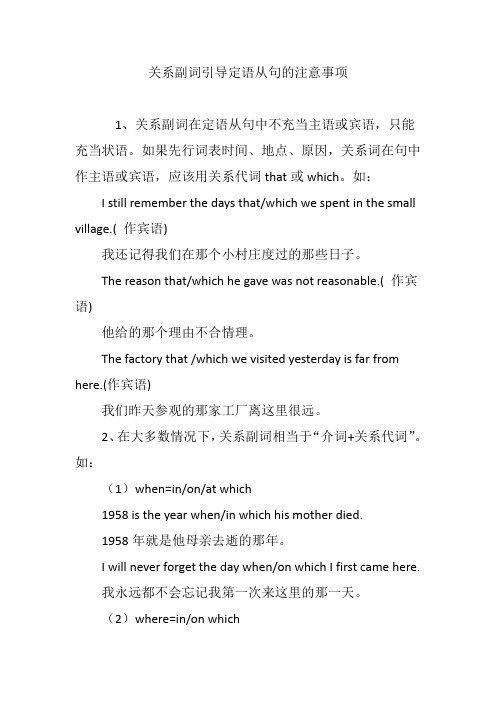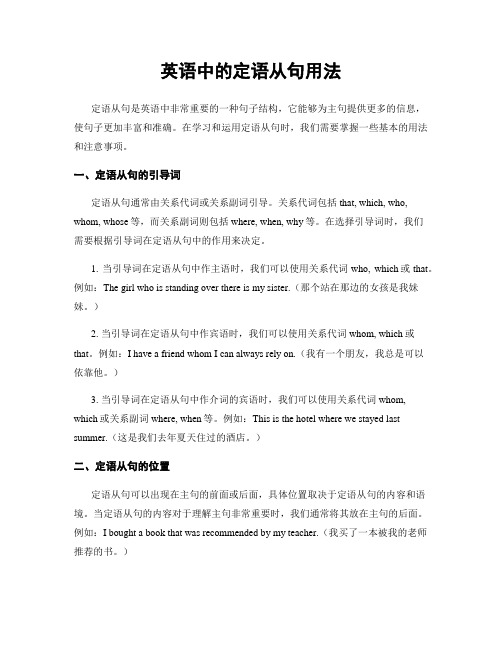定语从句的注意事项
- 格式:doc
- 大小:41.00 KB
- 文档页数:2

定语从句里where的用法一、引言定语从句是英语中常见的句子结构,用来对主句中的某个名词或代词进行修饰。
在定语从句中,我们经常会遇到一个特殊的关系副词—where。
本文将介绍where在定语从句中的主要用法及注意事项。
二、定语从句简介在英语中,定语从句通常由关系代词(如that, who, whom)或关系副词(如when, where, why)引导,并与主句中的某个名词或代词相关联。
这种结构可以使得我们在表达时更加简洁和准确。
三、Where引导定语从句1. 场所首先,where可以用来引导修饰场所名词的定语从句。
比如:- I will never forget the house where I grew up.- This is the park where we often go for a walk.2. 带有介词短语的场所除了修饰单个场所名词外,where还可用于修饰带有介词短语的场所。
比如:- He's sitting in the chair where his father always sits.- The café where we had lunch is very popular.3. 时间除了修饰场所名词外,where还可以用来表示时间,并引导修饰时间名词的定语从句。
比如:- This is the year where everything changed.- Can you remember the day where we first met?4. 引导非限制性定语从句where也可以用在引导非限制性定语从句的情况下,修饰整个前面的主句。
例如:- The city has many beautiful parks, where people can relax and enjoy nature.四、使用注意事项1. 区别关系副词和关系代词的用法需要注意的是,虽然where可以在定语从句中作为关系副词使用,但是同样可以作为关系代词来单独指代一个地点或时间。

关系副词引导定语从句的注意事项1、关系副词在定语从句中不充当主语或宾语,只能充当状语。
如果先行词表时间、地点、原因,关系词在句中作主语或宾语,应该用关系代词that或which。
如:I still remember the days that/which we spent in the small village.( 作宾语)我还记得我们在那个小村庄度过的那些日子。
The reason that/which he gave was not reasonable.( 作宾语)他给的那个理由不合情理。
The factory that /which we visited yesterday is far from here.(作宾语)我们昨天参观的那家工厂离这里很远。
2、在大多数情况下,关系副词相当于“介词+关系代词”。
如:(1)when=in/on/at which1958 is the year when/in which his mother died.1958年就是他母亲去逝的那年。
I will never forget the day when/on which I first came here.我永远都不会忘记我第一次来这里的那一天。
(2)where=in/on whichThe house where /in which he lives is very big.他住的那栋房子很大。
(3)why=for whichThis is the reason why/for which he was late.这就是他迟到的理由。
3、当crossing, situation, business, point等作先行词表抽象地点,其后常用where引导的定语从句。
如:I work in a business where almost everyone is waiting for the great chance.我在一家几乎人人都在等待发展机遇的大公司工作。

定语从句试讲10分钟定语从句是在句子中作定语的从句,用于修饰句子中的名词或代词。
在10分钟的试讲中,我们可以先介绍定语从句的定义和功能,然后讲解定语从句的引导词、结构以及注意事项。
一、定语从句的定义和功能1. 定语从句是修饰名词或代词的从句,限定或补充其所修饰的词的意义。
2. 定语从句可以修饰人、事、物等,用于提供进一步的信息和详细描述。
3. 定语从句可以是限制性的,也可以是非限制性的。
二、定语从句的引导词定语从句的引导词包括关系代词和关系副词。
1. 关系代词:who, whom, whose, which, that。
2. 关系副词:when, where, why。
三、定语从句的结构定语从句的结构包括关系词和从句。
1. 关系词在定语从句中担任句子成分。
2. 关系词引导的定语从句可以放在被修饰词的前面或后面。
3. 非限制性定语从句用逗号与主句分开。
四、定语从句的注意事项1. 当关系代词在定语从句中作宾语时,可以省略。
2. 关系代词who, whom, which可以有所指和不指,而关系代词that只能有所指。
3. 当关系代词在定语从句中位于介词后时,只能用whom或which,而不能用that。
4. 关系词后的动词形式应与先行词在逻辑上所表示的意义相一致。
五、练习题1. This is the book ___________ I bought yesterday.2. The boy ___________ father is a doctor is very smart.3. The car, ___________ is very expensive, belongs to my friend.4. The reason ___________ she gave for being late was not reasonable.5. The person ___________ I love most is my mother.六、总结通过本次试讲,我们了解了定语从句的定义和功能,掌握了定语从句的引导词、结构以及注意事项。

定语从句1、定语可以由形容词,名词,代词,数词,分词,副词,不定式以及介词短语来担任,也可以由一个句子来担任.定语从句是由关系代词或关系副词引导的从句,其作用是作定语修饰主句的某个名词性成分,相当于形容词,所以又称为形容词性从句.2、定语从句用来修饰名词,代词或整个主句.3、定语从句分为限定性和非限定性从句两种。
4、定语从句存在的条件:先行词+关系词+从句5、定语从句的构成步骤:1)找出先行词a.确定从句中关系代词的人称和数。
b.确定定语从句的位置(一般定语从句都紧跟在先行词后)2)确定关系代词在从句中所担当的成分,以确定关系代词的格。
3)确定从句时态,根据实际情况确定定语从句的时态(它的时态和语态都不受主句的限制)。
(一)定语从句及相关术语1、定语从句:修饰一个名词或代词的从句称为定语从句,一般紧跟在它所修饰的先行词后面。
2、关系词:引导定语从句的关联词成为关系词关系词有关系代词和关系副词。
关系代词有that, which, who, whom, whose, as等;关系副词有where, when, why等。
关系词常有3个作用:1. 引导定语从句 2. 代替先行词 3. 在定语从句中担当一个成分(二)关系代词引导的定语从句1.who指人,在从句中做主语(1) The boys who are playing football are from Class One.(2) Yesterday I helped an old man who lost his way.注意:当关系代词在定语从句中作主语时,谓语动词应与先行词的人称和数保持一致。
(1) I, who am your best friend, will do all that I can to help you.(2) The family, who are fond of music, go to the concert once a month.(3) He is one of the boys in our class who speak English well.(one of +复数名词+关系代词引导的定语从句谓语动词用复数形式)(4) He is the only one of the boys in our class who speaks English well.the (only;very;right) one of +复数名词+关系代词引导的定语从句谓语动词用单数形式)2. whom指人,在定语从句中充当动词或介词的宾语,常可省略。

英语中的定语从句用法定语从句是英语中非常重要的一种句子结构,它能够为主句提供更多的信息,使句子更加丰富和准确。
在学习和运用定语从句时,我们需要掌握一些基本的用法和注意事项。
一、定语从句的引导词定语从句通常由关系代词或关系副词引导。
关系代词包括that, which, who, whom, whose等,而关系副词则包括where, when, why等。
在选择引导词时,我们需要根据引导词在定语从句中的作用来决定。
1. 当引导词在定语从句中作主语时,我们可以使用关系代词who, which或that。
例如:The girl who is standing over there is my sister.(那个站在那边的女孩是我妹妹。
)2. 当引导词在定语从句中作宾语时,我们可以使用关系代词whom, which或that。
例如:I have a friend whom I can always rely on.(我有一个朋友,我总是可以依靠他。
)3. 当引导词在定语从句中作介词的宾语时,我们可以使用关系代词whom, which或关系副词where, when等。
例如:This is the hotel where we stayed last summer.(这是我们去年夏天住过的酒店。
)二、定语从句的位置定语从句可以出现在主句的前面或后面,具体位置取决于定语从句的内容和语境。
当定语从句的内容对于理解主句非常重要时,我们通常将其放在主句的后面。
例如:I bought a book that was recommended by my teacher.(我买了一本被我的老师推荐的书。
)另外,当定语从句的内容对于理解主句并不是非常重要时,我们通常将其放在主句的前面,并用逗号与主句隔开。
例如:The weather being fine, we decided to go for a picnic.(天气很好,我们决定去野餐。

《定语从句》讲义一、什么是定语从句在英语语法中,定语从句是一种非常重要的句子结构。
简单来说,定语从句就是在一个句子中充当定语成分的从句。
它用来修饰、限定或说明先行词,即被定语从句所修饰的名词或代词。
例如:The book that I bought yesterday is very interesting (“that I bought yesterday”就是一个定语从句,修饰先行词“the book”)二、定语从句的构成定语从句通常由关系词(关系代词或关系副词)引导。
关系代词有:that、which、who、whom、whose 等。
关系副词有:when、where、why 等。
关系代词在定语从句中充当主语、宾语、定语等成分;关系副词在定语从句中充当状语。
三、关系代词的用法1、 that 既可以指人,也可以指物,在定语从句中可以作主语、宾语。
例如:The man that is standing there is my teacher (that 作主语,指人)The book that I bought is very useful (that 作宾语,指物)2、 which 指物,在定语从句中可以作主语、宾语。
例如:The house which was built last year is very beautiful (which 作主语)The pen which you gave me is very nice (which 作宾语)3、 who 指人,在定语从句中作主语。
例如:The girl who is singing is my sister (who 作主语)4、 whom 指人,在定语从句中作宾语。
例如:The man whom I met yesterday is very kind (whom 作宾语)5、 whose 表示“……的”,在定语从句中作定语。
例如:The boy whose father is a doctor studies very hard (whose 作定语,修饰“father”)四、关系副词的用法1、 when 表示时间,在定语从句中作时间状语。
whereby引导的定语从句的详细回答如下:一、whereby的含义和用法whereby是一个单词,它是一个副词,表示“借以,凭”的意思。
在定语从句中,它相当于“by which”或者“through which”,引导定语从句修饰先行词。
二、whereby引导定语从句的用法1. 先行词通常是名词,例如:人、物、地方等。
2. 引导定语从句时,whereby在从句中充当方式状语。
3. 从句通常使用陈述语气,表示已知的事实。
三、使用whereby引导定语从句的注意事项1. 先行词通常有which、who、where等关系代词引导。
2. 在使用whereby引导定语从句时,需要考虑到整个句子的意思和语法结构。
3. 在定语从句中,需要使用陈述语气,并且使用的方式状语通常是表达事实或客观情况。
例如:I don't know the reason by which he lost the election. (我不知道他输掉选举的原因。
)在这个句子中,by which = whereby,是“通过…方法”的意思。
句子中which相当于名词reason。
另外一种理解是“因为什么原因”。
由于具体原因不知道,我们也不知道这个人是不是真失去了选举,可能是在暗示这些内容属于未来的未知内容需要确认才能知晓的意思。
在书面写作时最好加上which / whereby进行详细解释说明以体现通顺的逻辑关系。
总的来说,whereby是一个副词,可以引导定语从句修饰先行词。
在定语从句中,它通常充当方式状语,表示通过某种方式或途径。
在使用whereby引导定语从句时,需要考虑到先行词、从句成分和句子意思,确保语法和逻辑的正确性。
非限制性定语从句应用注意事项
1.非限制性定语从句通常不能用that 引导。
2.非限制性定语从句一般不能用why 引导,要用for which。
I had told them the reason, for which I didn't attend the meeting.
我已经告诉他们我没有出席会议的原因。
3.非限制性定语从句置于句首时,通常不能用which 引导。
关系代词as引导的非限制性定语从句位置比较灵活,可以放在主句前,也可以放在主句后。
As I expected, he didn't believe me.正如我所料,他不相信我。
4.非限制性定语从句由“介词+关系代词”引导时,其中的关系代词不能用as。
He spent more than $20,000 on the car, over which his father was angry. 他买这辆车花了两万多美元,这让他父亲很生气。
5.非限制性定语从句中,指人的关系代词作宾语时,一般只能用宾格whom,不能用who 替换,也不能省略。
Do you know Tom, whom we talked about? 你知道我们谈论的汤姆吗?。
定语从句的注意事项
一、定语从句中宜用that而不用which的情况
1.先行词是不定代词的时候,如all, much, something, everything, anything, nothing, none, the one等。
[eg.] We should do all that is useful to the people.
[eg.] There is nothing that can be said about it.
[eg.] Do you mean the one that was bought yesterday?
2.先行词被only, any, few, little, no, all, one of, just, very等词修饰时。
[eg.] The only thing that we can do was to wait.
[eg.] You can take any seat that is free.
[eg.] That is the very word that is wrongly used.
[eg.] This is only one of the evidences that reveal his crime.
3.先行词是序数词或者被序数词修饰时。
[eg.] This is the third film that has been shown in our school this term. 4.先行词是最高级或者被最高级修饰时。
[eg.] This is the best that can be done now.
[eg.] the most important thing that he should do is how to stop him from going on.
5.先行词既有人又有物。
[eg.] The writer and his novel that you have just talked about are really well known.
6.先行词为数词时。
[eg.] Yesterday I caught two fish and out them into a basin of water. Now you can see the two that is still alive.
7.如果有两个从句,其中一个关系词以用which为关系词,另一个应该用that。
Edison built up a factory which produced things that had never been seen before.
8.主句是there be结构修饰其主语的定语从句用that作为关系词。
[eg.] There is still a seat in the corner that is still free.
9.先行词为表语的时候,或者关系带词本身是定语从句的表语,宜用that。
[eg.] This is a good book that will help you a lot.
[eg.] My home village is no longer the place that it used to be.
10.一些特殊词为先行词的时候用that作先行词
[eg.] The way that you deal with him would ignite him.
二、定语从句中宜用which而不用that的情况
1.当关系带词前面有介词时。
[eg.] A zoo is a park in which many kids of animals are kept for exhibition. 2.在非限定性定语从句中。
[eg.] Crusoe’s dog, which was now very old, became ill and dead.
3.在一个句子中有两个从句,其中一个用了that,另外一个用which。
[eg.] Let me show you the novel that I barrowed from the library which was newly open to us.
4.当关系代词后有插入语时。
[eg.] Here is the English grammar which, as I have told you, will help improve your English.
三、定语从句中宜用who而不用that的情况
1.先行词为one, ones, anyone或those时。
[eg.] The person I what to learn from is the one who studies hard and works well.
2.There be结构中,修饰主语的定语从句宜用关系带词who指代人。
[eg.] There is gentleman who wants to see you.
3.当先行词有较长的后置定语的时候。
[eg.] I meet a foreigner in the park yesterday afternoon who could speak Chinese well.
4.一个句子中带有两个定语从句,其中一个已经用了that做关系带词,另外一个用who。
[eg.] The student that was praised at yesterday’s meeting is the monitor who is very modest and works very hard.
四、限定性定语从句和非限定性(描述性)定语从句
从定语从句和它所修饰的先行词的关系来看,定语从句优先定性和非限定性的差别。
限定性定语从句限定了先行词的范围和意思,这类从句不能省去。
如果省去剩下的部分(即主句)的意思就会变得不清楚。
这种定语从句和主句的关系十分密切,书写时中间不用都好将两个小句分开。
非限定性定语从句(有时也称为描述性定语从句)只起补充说明作用。
如果省去从句,剩下的部分意思仍然清楚。
书写时两个小句中间用逗号隔开。
试比较:[eg.] I have found a man who can help you.(限定性,去掉从句意思就不明了)[eg.] Autumn in Peking is the season which is neither hot nor cold.
[eg.] This is the place where his great work was written.
[eg.] Yesterday I visited Mr. Marcus, who was ill.(描述性,去掉后主句意思不受影响)
[eg.] I knocked at the door, which immediately opened.
有时同一个定语从语可以是限制性的,也可以是非限制性(描述性)的,就看在先行词和关系词之间是否有逗号。
加了逗号,不仅改变了句子的性质,而且很可能改变句意。
试比较下列句子:
[eg.] She has a sister who is a musician.她有一个是音乐家的姐姐。
(她有很多个姐姐)
[eg.] She has a sister, who is a musician.她有一个姐姐,是音乐家。
(她又且只有一个姐姐)
[eg.] He borrowed all the books which had pictures in them.(他只借来有图画的书,其他的没借)
[eg.] He borrowed all the books, which had pictures in them.(他借了所有的书,书里都有画)
[eg.] In the class there are twelve students, who are good at maths.(这个班不止12个学生)
[eg.] In the class there are twelve students who are good at maths.(这个班一共有12个学生)
[eg.] I met with lots of difficulties which I had not expected.(困难是没有预料到的)
[eg.] I met with lots of difficulties,which I had not expected.(语到很多困难的这种情况没有预料到。
)。